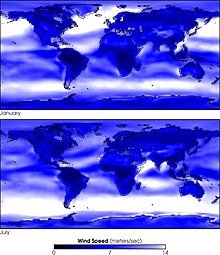Climate and energy
Appearance

In the 21st century, the earth's climate and its energy policy interact and their relationship is studied and governed by a variety of national and international institutions.[1]
The correlation between climate and energy rests on known causal relationships between human population growth, rising energy consumption and land use and the resulting greenhouse gas emissions and climate change.[2][3][4][5][6]
The concern for climate change control and mitigation has consequently spurred policy makers and scientists to treat energy use and global climate as an inextricable nexus with effects also going in reverse direction[7] and create various initiatives, institutions and think tanks for a high-level treatment of the relationships:
- Major Economies Forum on Energy and Climate Change (global)
- Americas Energy and Climate Symposium (Americas)
- Ministry of Climate, Energy and Building (Denmark)
- Business for Innovative Climate and Energy Policy (US)
- United States House Select Committee on Energy Independence and Global Warming (US)
- European Union climate and energy package (EU)
- Department of Energy and Climate Change (UK)
- White House Office of Energy and Climate Change Policy (US)
- Department of Climate Change and Energy Efficiency (Australia)
- Minister for the Environment and Energy (Australia)
- Climate Change and Sustainable Energy Act 2006
- Wuppertal Institute for Climate, Environment and Energy (Germany)
- Center for Climate and Energy Solutions (UK)
- City of Oakland Energy and Climate Action Plan (US)
- Energy and Climate Change Select Committee (UK)
- San Diego Journal of Climate and Energy Law (US)
- Renewable Energy Sources and Climate Change Mitigation (United Nations)
See also
References
- ^ Zelli; Bäckstrand; Nasiritousi; Skovgaard; Widerberg (2020), Governing the Climate-Energy Nexus, Cambridge University Press, pp. 1–8, ISBN 9781108484817
- ^ Jones, Glenn A.; Warner, Kevin J. (2016). "The 21st century population-energy-climate nexus". Energy Policy. 93. Elsevier BV: 206–212. doi:10.1016/j.enpol.2016.02.044. ISSN 0301-4215.
- ^ Dale, Virginia H.; Efroymson, Rebecca A.; Kline, Keith L. (2011-05-15). "The land use–climate change–energy nexus". Landscape Ecology. 26 (6). Springer Nature: 755–773. Bibcode:2011AGUFMPA32A..03D. doi:10.1007/s10980-011-9606-2. ISSN 0921-2973. S2CID 2077651.
- ^ Ram Avtar; Saurabh Tripathi; Ashwani Kumar Aggarwal; Pankaj Kumar (2019). "Population–Urbanization–Energy Nexus: A Review". Resources. 8 (3): 136. doi:10.3390/resources8030136.
- ^ Paolo D'Odorico; Kyle Frankel Davi (2018). "The Global Food‐Energy‐Water Nexus". Reviews of Geophysics. 56 (3): 456–531. doi:10.1029/2017RG000591.
- ^ Mullan, B.; Haqq-Misra, J. (2019). "Population growth, energy use, and the implications for the search for extraterrestrial intelligence". Futures. 106. Elsevier BV: 4–17. arXiv:1806.06474. Bibcode:2019Fut...106....4M. doi:10.1016/j.futures.2018.06.009. ISSN 0016-3287. S2CID 119387595.
- ^ "Climate Impacts on Energy - Climate Change Impacts". US EPA. 2016-05-25. Retrieved 2018-03-01.
